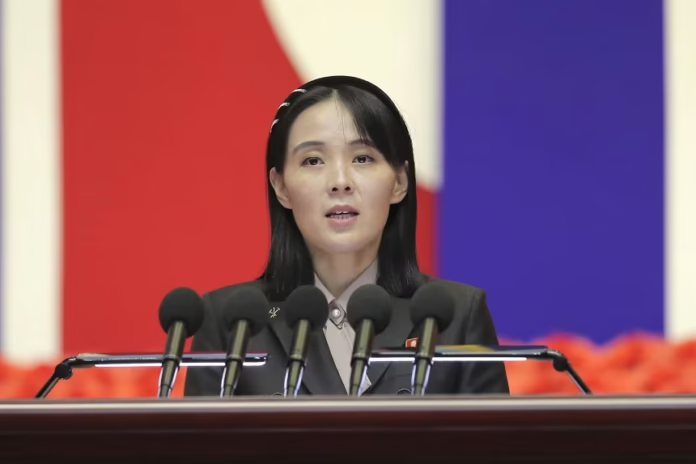Written by Lisa Murimi
In a pointed rebuke, Kim Yo Jong, the influential sister of North Korean leader Kim Jong Un, has dismissed South Korean claims that Pyongyang is dismantling some of its propaganda loudspeakers along the inter-Korean border, undercutting Seoul’s hopes for a thaw in relations.
The South Korean military reported last weekend that it had observed the North removing certain front-line speakers—equipment used for broadcasts across the heavily fortified Demilitarized Zone (DMZ).
The announcement came days after Seoul began dismantling its own speakers, which had previously transmitted anti-Pyongyang messages and K-pop music, as part of President Lee Jae Myung’s early moves to ease tensions.
Lee described the reported North Korean action as a “reciprocal measure” and expressed optimism that the Koreas could “gradually reopen dialogue and communication.”
However, in remarks published by North Korean state media Thursday, Kim accused Lee’s government of misleading the public.
“We have never removed loudspeakers installed on the border area and are not willing to remove them,” she said.
From a diplomatic standpoint, Kim’s rejection underscores Pyongyang’s unwillingness to engage in even symbolic gestures toward rapprochement.
Her comments reaffirm that North Korea remains focused on consolidating its alliance with Russia, rather than re-entering negotiations with Seoul or Washington.
Kim also dismissed speculation that Pyongyang might leverage this week’s planned meeting between Russian President Vladimir Putin and U.S. President Donald Trump to convey messages to Washington.
“Why should we send a message to the U.S. side?” she said, highlighting the regime’s continued disinterest in nuclear or security talks that have been stalled since the collapse of the 2019 Trump-Kim summit.
Since Russia’s invasion of Ukraine in 2022, North Korea has reoriented much of its foreign policy toward Moscow, supplying military personnel and equipment in exchange for diplomatic backing and possible technological assistance.
On Wednesday, Kim Jong Un and Putin held a phone call discussing their deepening partnership and coordination on global security issues, further signaling Pyongyang’s strategic pivot away from the U.S.-led diplomatic track.
The loudspeaker dispute is emblematic of the broader stalemate. For decades, both Koreas have used border broadcasts as tools of psychological warfare, switching them on and off as political leverage.
While Lee’s dismantling of South Korean loudspeakers marked his government’s first concrete step toward easing tensions, Kim Yo Jong’s categorical denial suggests Pyongyang views such measures as insufficient, or irrelevant, in the face of what it perceives as ongoing hostility—particularly the annual joint U.S.-South Korean military drills scheduled for August 18.
From an inter-Korean diplomacy perspective, this episode highlights the persistent climate of mistrust shaping relations between the two Koreas.
While Seoul’s liberal government appears committed to gradual engagement, Pyongyang’s strategic focus remains firmly fixed on cultivating alliances—particularly with Russia—which it views as offering greater security assurances and economic advantages than renewed dialogue with the South.
Analysts warn that the upcoming military exercises could escalate tensions further, potentially triggering new weapons tests or border provocations.



















